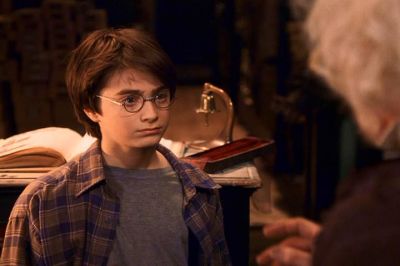


All of this is owed, as ever, to Chris Columbus's monumental work on the first two films, establishing an entire world of characters, creatures and effects that immerses us wholly to this day.

Prisoner of Azkaban set a new bar for what the films could be visually. It draws on the gloom of Half-Blood Prince and the adrenaline of Order of the Phoenix and Goblet of Fire. Of course, Deathly Hallows - Part 1 finds itself in the position of being able to take such creative leaps because of the six films before it. The magical whimsy of " Hedwig's Theme (Opens in a new tab)" is nowhere to be found. The film plunges us in headfirst, declaring that this is a story of children bearing unimaginable burdens, and that Harry is not the only one to lose his loved ones to this war. In the Deathly Hallows novel, we begin - as we often do - with Harry, but hear about Hermione's monumental sacrifice later on. It's a powerful starting note, taking just enough liberty from the text. Against Alexandre Desplat's " Obliviate (Opens in a new tab)," one of the most stirring pieces of music in the series, we watch Hermione wipe her parents' memories and disappear from their lives in order to protect them. The film opens with a montage of Harry, Ron, and Hermione preparing essentially to go to war. A less knowledgeable scholar of the Potter film franchise might recall Deathly Hallows - Part 1 as "the one with the camping," which is extremely unfair because camping comprises roughly 23 percent of the movie's 146-minute runtime - but we'll get back to that. 19 marked the 10-year anniversary of this movie, which makes it a great time to revisit what makes Deathly Hallows - Part 1 so fantastic. You can almost feel when they are alone together that it could slip into something that was more just friendship and that tension is really interesting.Nov.

It's friendship but it almost becomes something else. In behind the scenes footage, Yates commented: "In the middle of that dance, they get very close and it starts to get complicated in a way. JK Rowling herself may have said that Hermione should have got together with Harry rather than Ron but this scene in the movie shows how much Hermione loves Ron. This is also the scene that cements Harry and Hermione's status as friends. It not only shows how Harry and Hermione's friendship matured, but how the movies themselves matured Again, this ties in with "Potter," too, as Voldemort's fascist regime, where certain people are deemed "unpure" or not really even people, has been compared to that of Adolf Hitler and the Nazis. There's even a theory that the song is about the Nazi movement during WWII with lines like "forgive us now for what we've done" applying to German soldiers.


 0 kommentar(er)
0 kommentar(er)
